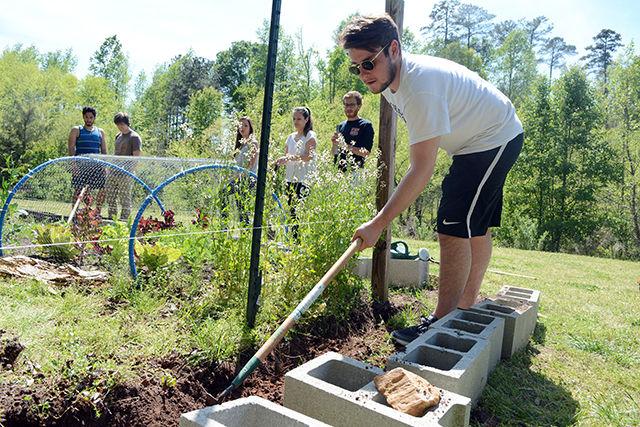
Sam Feldstein
Quentin Moreaux, a student attending the SKEMA Business School, digs one of the sides of one of the garden beds to construct a barrier at the Soul Garden located beside the Lake Raleigh dam Saturday. According to Catie McEntee, a graduate student studying electrical power systems engineering and co-manager of the Soul Garden, the garden is a community organic garden used to teach people how to grow organic food which was created in 2010, recently received an $800 grant from the sustainability fund. The grant will be used to build two fences, two cinder block beds and educational signage.
Down the hill from Centennial Campus, on the walking trail around Lake Raleigh, a simple wooden sign reads “SOUL Garden,” the sound of shuffling dirt can be heard. Following a short dirt trail, students will find several flowerbeds filled with sprouting vegetables.
The NC State SOUL — Students for Organic, United Living — Garden is a student-run garden that predominantly grows vegetables and fruit. All of the work done on the garden is volunteer-based. The garden began after two NC State students received a Think Outside the Brick grant from Student Government to create NC State’s first on-campus community garden in 2009, according to its website.
“They used that to start the garden, and ever since then, we’ve been planting and harvesting every year and trying to grow our volunteer base,” said Catie McEntee, the co-manager of SOUL Garden and a graduate student studying electric power systems engineering.
McEntee said the garden is typically worked on Saturday afternoons around 2 p.m. as long as the weather is good. The garden welcomes volunteers to drop in unannounced.
“We plant mostly vegetables at the garden along with a few fruit trees because we really want people to be able to grow their own food,” McEntee said. “The food goes to the volunteers, and when we have a big harvest, we send some food to the Inter-Faith Food Shelter.”
McEntee said that the SOUL Garden has had a lot of different NC State organizations volunteer in the past including the EcoVillage and the Wolfpack Environmental Student Association, as well as some fraternities and sororities.
“Each Saturday we try to plan for a certain group to come in along with any volunteers who want to come so that we can keep track of who is planting what and where,” McEntee said. “Any student that wants to come and help out is definitely welcome. They can bring seeds or use the seeds that we have to plant whatever they want.”
In addition to seeds, the garden provides a variety of tools for free use to anyone interested in growing plants.
“The only tools that you might want to bring are a water bottle, some gardening gloves and a container to bring home some produce,” McEntee said.
McEntee said that the garden raises money by fundraising and selling 3-by-5 feet plots to students for $10 a year. The garden also applied for and received a Sustainability Fund grant.
Student fees pay for the Sustainability Fund, and the money generated from the fund is partitioned out to different organizations around campus involved with sustainability-related projects. Every full-time student pays $2.25 toward the fund each year.
McEntee said the SOUL Garden received $800 from the Sustainability Fund this year, which they are using to build two fences, two cinderblock garden beds and some educational signage planned for later on in the year.
The garden is currently growing kale, lettuce, spinach and strawberries. In addition to the plants, the garden is growing two peach trees, an apple tree, a pear tree and a fig tree that is already producing fruit. The garden collects water using rain barrels and extra water from Lake Raleigh.
McEntee said that, if the garden is well managed during the summer, it can produce a surprisingly big harvest, which helps its goal of giving students an opportunity to grow their own food.
“I eat tons of the produce that comes from here,” said Lanon Mackey, a long-time volunteer at the SOUL Garden and a graduate studying electric power systems engineering. “Every week I bring compost from home and I take my bucket back full of kale, and squash, and carrots and lettuce.”
Since Mackey became a vegetarian last year, he said the SOUL Garden has benefited his diet. And beyond that, it has also impacted his education in engineering by acting as a great activity for stress relief so close to campus.
“It has been a turnaround during my engineering career,” Mackey said. “Coming down here has helped me destress during the day. Being able to come right down here by the creek and the lake and work in the garden, even just laying down in the grass away from campus and enjoying sunshine, has helped keep me calm and centered throughout the day, especially with exam period coming on.”
Mackey said his work for the SOUL Garden has inspired him to start a garden of his own. He said an important factor in deciding what house he wants to buy is whether or not it has a southern-facing sunny side for a garden.
“I had never really gardened for my own food prior to the SOUL Garden,” Mackey said. “I still have a lot to learn. Learning about composting has really intrigued me recently because I like the idea of reducing our waste. We throw a lot of things away in America. Every time I bring my compost here instead of throwing it away at my apartment I think that’s an accomplishment.”
Mackey said that the garden has begun to successfully re-harvest seeds. The garden now has a full rosemary plant that started from a trimming from a window sill plant. Mackey is currently growing potatoes and celery started from scraps from his house.
More information about the SOUL Garden can be found at the club’s website at soulgarden.weebly.com.